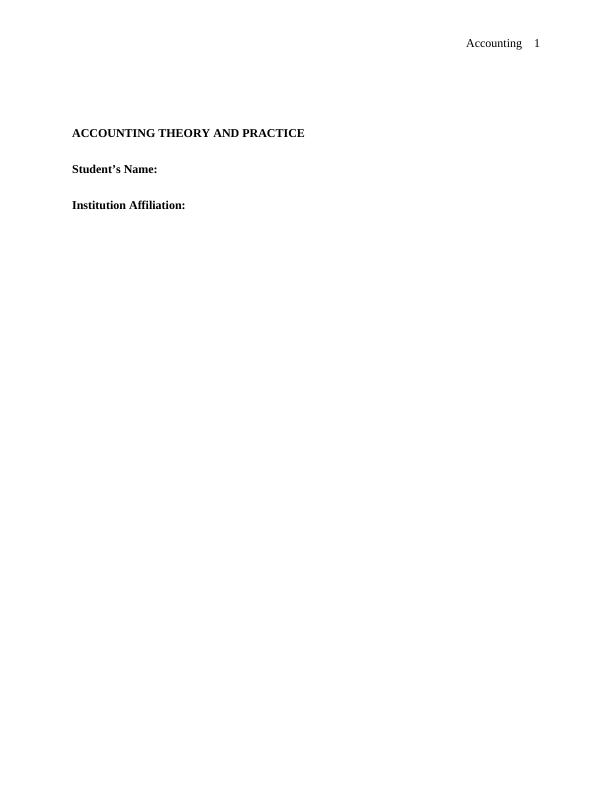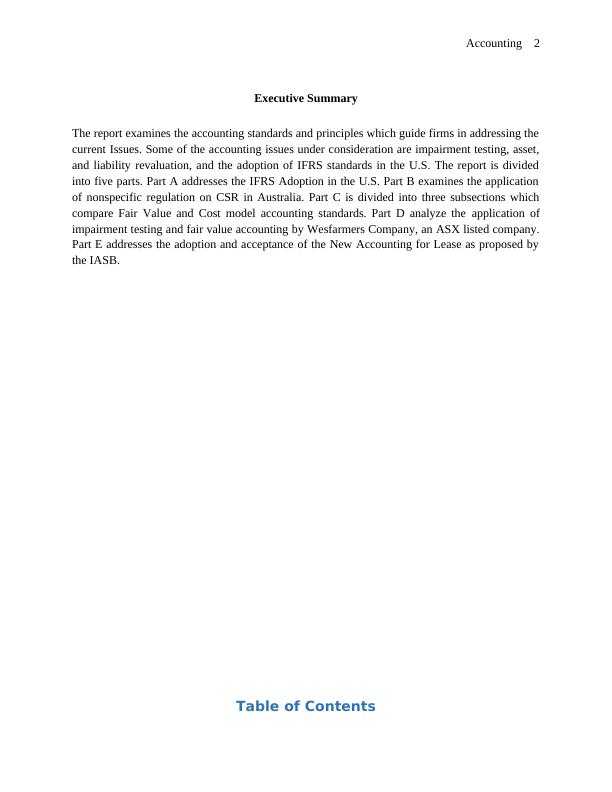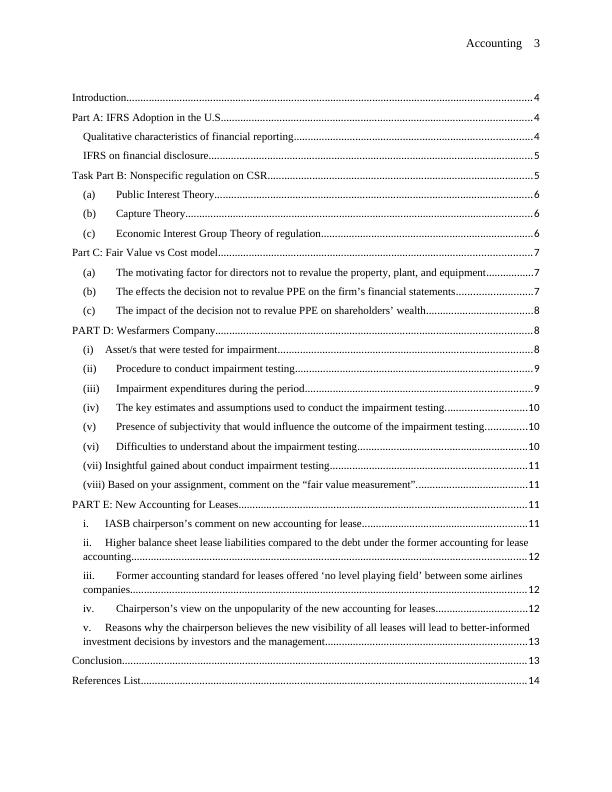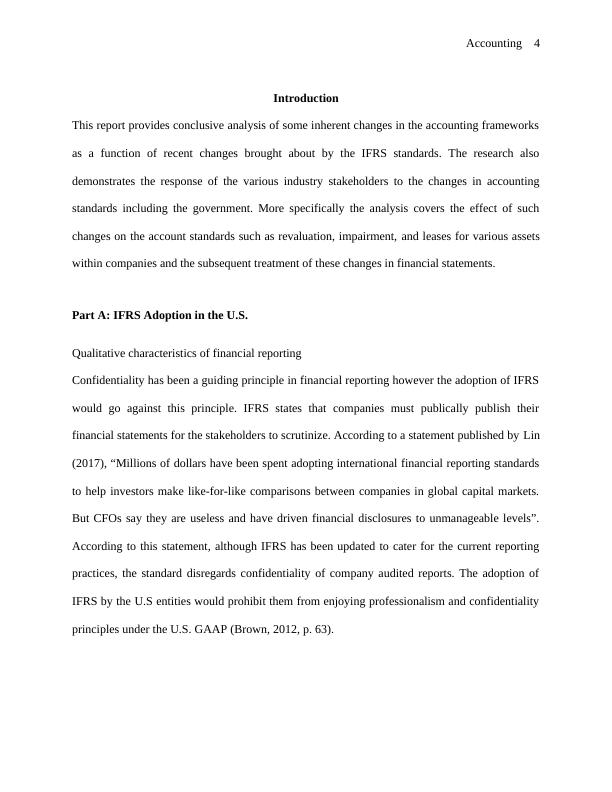Accounting Standards and Issues: IFRS Adoption, CSR Regulation, Fair Value vs. Cost Model
Added on 2023-04-25
17 Pages3807 Words435 Views
Accounting 1
ACCOUNTING THEORY AND PRACTICE
Student’s Name:
Institution Affiliation:
ACCOUNTING THEORY AND PRACTICE
Student’s Name:
Institution Affiliation:

Accounting 2
Executive Summary
The report examines the accounting standards and principles which guide firms in addressing the
current Issues. Some of the accounting issues under consideration are impairment testing, asset,
and liability revaluation, and the adoption of IFRS standards in the U.S. The report is divided
into five parts. Part A addresses the IFRS Adoption in the U.S. Part B examines the application
of nonspecific regulation on CSR in Australia. Part C is divided into three subsections which
compare Fair Value and Cost model accounting standards. Part D analyze the application of
impairment testing and fair value accounting by Wesfarmers Company, an ASX listed company.
Part E addresses the adoption and acceptance of the New Accounting for Lease as proposed by
the IASB.
Table of Contents
Executive Summary
The report examines the accounting standards and principles which guide firms in addressing the
current Issues. Some of the accounting issues under consideration are impairment testing, asset,
and liability revaluation, and the adoption of IFRS standards in the U.S. The report is divided
into five parts. Part A addresses the IFRS Adoption in the U.S. Part B examines the application
of nonspecific regulation on CSR in Australia. Part C is divided into three subsections which
compare Fair Value and Cost model accounting standards. Part D analyze the application of
impairment testing and fair value accounting by Wesfarmers Company, an ASX listed company.
Part E addresses the adoption and acceptance of the New Accounting for Lease as proposed by
the IASB.
Table of Contents

Accounting 3
Introduction.................................................................................................................................................4
Part A: IFRS Adoption in the U.S...............................................................................................................4
Qualitative characteristics of financial reporting.....................................................................................4
IFRS on financial disclosure....................................................................................................................5
Task Part B: Nonspecific regulation on CSR...............................................................................................5
(a) Public Interest Theory..................................................................................................................6
(b) Capture Theory............................................................................................................................6
(c) Economic Interest Group Theory of regulation............................................................................6
Part C: Fair Value vs Cost model................................................................................................................7
(a) The motivating factor for directors not to revalue the property, plant, and equipment.................7
(b) The effects the decision not to revalue PPE on the firm’s financial statements...........................7
(c) The impact of the decision not to revalue PPE on shareholders’ wealth......................................8
PART D: Wesfarmers Company.................................................................................................................8
(i) Asset/s that were tested for impairment...........................................................................................8
(ii) Procedure to conduct impairment testing.....................................................................................9
(iii) Impairment expenditures during the period.................................................................................9
(iv) The key estimates and assumptions used to conduct the impairment testing.............................10
(v) Presence of subjectivity that would influence the outcome of the impairment testing...............10
(vi) Difficulties to understand about the impairment testing.............................................................10
(vii) Insightful gained about conduct impairment testing......................................................................11
(viii) Based on your assignment, comment on the “fair value measurement”........................................11
PART E: New Accounting for Leases.......................................................................................................11
i. IASB chairperson’s comment on new accounting for lease...........................................................11
ii. Higher balance sheet lease liabilities compared to the debt under the former accounting for lease
accounting.............................................................................................................................................12
iii. Former accounting standard for leases offered ‘no level playing field’ between some airlines
companies..............................................................................................................................................12
iv. Chairperson’s view on the unpopularity of the new accounting for leases.................................12
v. Reasons why the chairperson believes the new visibility of all leases will lead to better-informed
investment decisions by investors and the management........................................................................13
Conclusion.................................................................................................................................................13
References List..........................................................................................................................................14
Introduction.................................................................................................................................................4
Part A: IFRS Adoption in the U.S...............................................................................................................4
Qualitative characteristics of financial reporting.....................................................................................4
IFRS on financial disclosure....................................................................................................................5
Task Part B: Nonspecific regulation on CSR...............................................................................................5
(a) Public Interest Theory..................................................................................................................6
(b) Capture Theory............................................................................................................................6
(c) Economic Interest Group Theory of regulation............................................................................6
Part C: Fair Value vs Cost model................................................................................................................7
(a) The motivating factor for directors not to revalue the property, plant, and equipment.................7
(b) The effects the decision not to revalue PPE on the firm’s financial statements...........................7
(c) The impact of the decision not to revalue PPE on shareholders’ wealth......................................8
PART D: Wesfarmers Company.................................................................................................................8
(i) Asset/s that were tested for impairment...........................................................................................8
(ii) Procedure to conduct impairment testing.....................................................................................9
(iii) Impairment expenditures during the period.................................................................................9
(iv) The key estimates and assumptions used to conduct the impairment testing.............................10
(v) Presence of subjectivity that would influence the outcome of the impairment testing...............10
(vi) Difficulties to understand about the impairment testing.............................................................10
(vii) Insightful gained about conduct impairment testing......................................................................11
(viii) Based on your assignment, comment on the “fair value measurement”........................................11
PART E: New Accounting for Leases.......................................................................................................11
i. IASB chairperson’s comment on new accounting for lease...........................................................11
ii. Higher balance sheet lease liabilities compared to the debt under the former accounting for lease
accounting.............................................................................................................................................12
iii. Former accounting standard for leases offered ‘no level playing field’ between some airlines
companies..............................................................................................................................................12
iv. Chairperson’s view on the unpopularity of the new accounting for leases.................................12
v. Reasons why the chairperson believes the new visibility of all leases will lead to better-informed
investment decisions by investors and the management........................................................................13
Conclusion.................................................................................................................................................13
References List..........................................................................................................................................14

Accounting 4
Introduction
This report provides conclusive analysis of some inherent changes in the accounting frameworks
as a function of recent changes brought about by the IFRS standards. The research also
demonstrates the response of the various industry stakeholders to the changes in accounting
standards including the government. More specifically the analysis covers the effect of such
changes on the account standards such as revaluation, impairment, and leases for various assets
within companies and the subsequent treatment of these changes in financial statements.
Part A: IFRS Adoption in the U.S.
Qualitative characteristics of financial reporting
Confidentiality has been a guiding principle in financial reporting however the adoption of IFRS
would go against this principle. IFRS states that companies must publically publish their
financial statements for the stakeholders to scrutinize. According to a statement published by Lin
(2017), “Millions of dollars have been spent adopting international financial reporting standards
to help investors make like-for-like comparisons between companies in global capital markets.
But CFOs say they are useless and have driven financial disclosures to unmanageable levels”.
According to this statement, although IFRS has been updated to cater for the current reporting
practices, the standard disregards confidentiality of company audited reports. The adoption of
IFRS by the U.S entities would prohibit them from enjoying professionalism and confidentiality
principles under the U.S. GAAP (Brown, 2012, p. 63).
Introduction
This report provides conclusive analysis of some inherent changes in the accounting frameworks
as a function of recent changes brought about by the IFRS standards. The research also
demonstrates the response of the various industry stakeholders to the changes in accounting
standards including the government. More specifically the analysis covers the effect of such
changes on the account standards such as revaluation, impairment, and leases for various assets
within companies and the subsequent treatment of these changes in financial statements.
Part A: IFRS Adoption in the U.S.
Qualitative characteristics of financial reporting
Confidentiality has been a guiding principle in financial reporting however the adoption of IFRS
would go against this principle. IFRS states that companies must publically publish their
financial statements for the stakeholders to scrutinize. According to a statement published by Lin
(2017), “Millions of dollars have been spent adopting international financial reporting standards
to help investors make like-for-like comparisons between companies in global capital markets.
But CFOs say they are useless and have driven financial disclosures to unmanageable levels”.
According to this statement, although IFRS has been updated to cater for the current reporting
practices, the standard disregards confidentiality of company audited reports. The adoption of
IFRS by the U.S entities would prohibit them from enjoying professionalism and confidentiality
principles under the U.S. GAAP (Brown, 2012, p. 63).

End of preview
Want to access all the pages? Upload your documents or become a member.
Related Documents
Accounting Theory and Current Issues EXECUTIVE SUMMARYlg...
|13
|4027
|488
Accounting Theory and Current Issueslg...
|18
|4448
|392
Financial Reporting Assignment | Advance Finance Impairmentlg...
|15
|2989
|37
Accounting Theory and Current Issues Name of the University Author(s)lg...
|17
|4015
|185
Advance Financial Accounting Assignment - Chandler Macleod Group Limitedlg...
|14
|3155
|56
Report on Financial Impairment of AMP Limitedlg...
|15
|3074
|72
